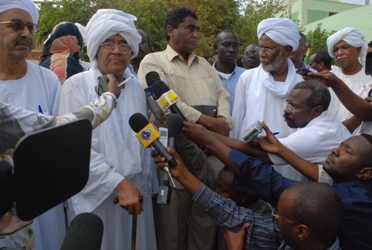Sudan opposition alliance refuses to accept government’s dialogue initiative
March 17, 2014 (KHARTOUM) – Sudan’s opposition alliance known as the National Consensus Forces (NCF) has renewed its rejection of the national dialogue initiative launched by the ruling National Congress Party (NCP).

They also called for cancellation of laws restricting freedoms and releasing political detainees besides identifying perpetrators connected to killings of protestors in demonstrations of September 2013 and to bring them to justice.
The opposition umbrella further demanded putting an end to wars in Darfur, South Kordofan and the Blue Nile.
The leaders of twelve NCF parties including the SCP secretary general, Mohamed Mokhtar al-Khateeb, the Sudanese Congress Party chairman, Ibrahim al-Sheikh, the Sudanese Alliance Party (SAP) chairman, Abdel-Aziz Khaled, and the deputy chairman of the Unionist Movement Party (UMP), Abu Al-Hassan Farah, have met on Monday to discuss the current political situation and arrange for the coming period.
The Sudanese Congress Party chairman, Ibrahim al-Sheikh, said in a press conference following the meeting that NCF parties broke the blockade imposed on their headquarters by the security forces and met with their constituencies in the public squares.
He underscored that their demands include creating a political environment conducive for dialogue, allowing press and trade unions freedoms, allowing freedom of political action, canceling all laws restricting freedoms, declaring immediate cease-fire and engaging in a full and comprehensive negotiations with rebel groups.
Al-Sheikh said the regime failed the test of dialogue with political parties when riot police and security forces used tear gas to dispersed protestors at al-Rabta square and the Sudanese Congress Party’s headquarters last Saturday.
He warned that the recent escalation of war in Darfur brought to minds memories of the situation in 2003 when the war first erupted including burning of villages and displacement of population, noting that regime’s practices suggest that it is working on separating Darfur from Sudan just as it did with South Sudan.
Al-Sheikh accused those who he called “thugs” of using tear gas to disperse protestors at al-Rabta square in Shambat neighborhood in north Khartoum and at his party’s headquarters besides looting properties of political parties’ headquarters.
The UMP deputy chairman, Abu al-Hassan Farah, for his part, said the regime’s recent policies would lead to a catastrophic situation, asserting that Sudan has exceeded Syria in terms of the number of deaths and displaced people particularly as the country suffers from security, political, and economic crises as well as deteriorating regional and international relations.
The NCF issued the “Shambat declaration” on Monday saying the NCP proved that it doesn’t have a political vision that enables it to lead a comprehensive dialogue in order to overcome the political crisis which continued since it seized power in a military coup in 1989.
It emphasized that the NCF announced its mass meeting at Shambat square last Saturday to assert its right to address the Sudanese people freely in the open air and to test the credibility of the regime’s call for dialogue, saying the regime mobilized large army of police and security forces backed by heavily armed vehicles to crush the defenseless citizens.
The declaration added that regime’s action towards the mass meeting in Shambat hit the last nail in the coffin of the alleged dialogue initiative, wondering how the victim could engage in a dialogue with his executioner and how the prisoner could talk to his jailer while the latter is pointing a gun at his head.
It further stressed that there are no negotiations, dialogue, or compromise on natural rights and said full freedom is not a gift from the regime but a right that must be taken forcefully, adding that dialogue must only be held for dismantling the current regime and establishing a transitional government.
Meanwhile, the governor of Khartoum state Abdel-Rahman al-Khidir, said that a declaration for organizing activities of all political parties will be announced next week in line with the national dialogue led by president Omer Hassan al-Bashir.
Al-Khidir, who addressed a crowed at the east Nile locality on Monday, said that freedom of expression is guaranteed for all individuals or groups provided that it does not violate others citizens’ freedom.
“We wouldn’t allow anybody whatsoever to block public roads because this action violates freedom of other citizens”, he added.
The governor stressed that his government responds to people’s demands with conviction and does not bow to pressures and threats.
In a related issue, the presidential media secretary, Emad Sid Ahmed, said in a press release on Monday that a meeting between Bashir and the political parties which rejected the call for national dialogue “is still possible” despite the fact that presidential meetings with political parties has ended on Saturday night, pointing that meetings included 57 parties.
He added it is possible that the president could meet with the Sudanese Communist Party (SCP), Arab Ba’ath Party (ABP), and the Sudanese Congress Party to listen to their views on the comprehensive national dialogue.
Late last January, president Omer Hassan Al-Bashir announced a four-point plan for reform “to stop the war and bring peace, free political society, fight against poverty and revitalize national identity”. He further called for political forces to engage in dialogue to agree on the implementation items though he did not specify practical steps to do so.
The opposition National Umma Party (NUP) and the opposition Popular Congress Party (PCP) are the only opposition parties who so far accepted Bashir’s call for national dialogue.
Sudan’s opposition parties call for establishing a transitional government and holding a national conference with the participation of rebel groups to discuss a peaceful solution for the conflicts in Darfur region, South Kordofan, and Blue Nile states.
The interim government would organize general elections once a political agreement on constitutional matters is reached, inaugurating a new democratic regime. But the NCP rejects this proposal saying opposition parties must simply prepare for the 2015 elections and that rebels should sign first peace accords.
(ST)
